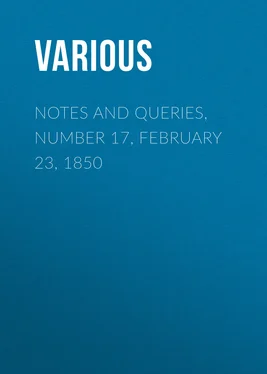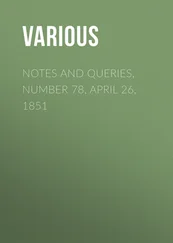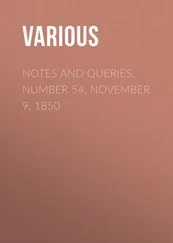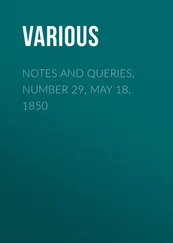Various - Notes and Queries, Number 17, February 23, 1850
Здесь есть возможность читать онлайн «Various - Notes and Queries, Number 17, February 23, 1850» — ознакомительный отрывок электронной книги совершенно бесплатно, а после прочтения отрывка купить полную версию. В некоторых случаях можно слушать аудио, скачать через торрент в формате fb2 и присутствует краткое содержание. Жанр: foreign_antique, periodic, foreign_edu, на английском языке. Описание произведения, (предисловие) а так же отзывы посетителей доступны на портале библиотеки ЛибКат.
- Название:Notes and Queries, Number 17, February 23, 1850
- Автор:
- Жанр:
- Год:неизвестен
- ISBN:нет данных
- Рейтинг книги:4 / 5. Голосов: 1
-
Избранное:Добавить в избранное
- Отзывы:
-
Ваша оценка:
- 80
- 1
- 2
- 3
- 4
- 5
Notes and Queries, Number 17, February 23, 1850: краткое содержание, описание и аннотация
Предлагаем к чтению аннотацию, описание, краткое содержание или предисловие (зависит от того, что написал сам автор книги «Notes and Queries, Number 17, February 23, 1850»). Если вы не нашли необходимую информацию о книге — напишите в комментариях, мы постараемся отыскать её.
Notes and Queries, Number 17, February 23, 1850 — читать онлайн ознакомительный отрывок
Ниже представлен текст книги, разбитый по страницам. Система сохранения места последней прочитанной страницы, позволяет с удобством читать онлайн бесплатно книгу «Notes and Queries, Number 17, February 23, 1850», без необходимости каждый раз заново искать на чём Вы остановились. Поставьте закладку, и сможете в любой момент перейти на страницу, на которой закончили чтение.
Интервал:
Закладка:
we have the following editorial comment:—"These two lines are a versification of a saying of Montaigne." (!!!) The saying is not by Montaigne, but by La Rochefoucauld:—
"On peut trouver des femmes qui n'ont jamais eu de galanterie; mais il est rare d'en trouver qui n'en aient jamais eu qu'une."— Max. 73.
Byron borrows the same idea again:—
"Writing grows a habit, like a woman's gallantry. There are women who have had no intrigue, but few who have had but one only; so there are millions of men who have never written a book, but few who have written only one."— Observations upon an Article in Blackwood's Magazine ; Byron's Works , vol. xv. p. 87, Moore's Edition, 17 vols duod. London, 1833.
Both the silence of the author, and the blunder of his editor, seem to me to prove that Les Maximes are not as generally known and studied as they deserve to be.
MELANION.ST. ANTHOLIN'S
Your correspondent MR. RIMBAULT (No. 12.) has made rather a grave charge against my predecessors in office as churchwardens and overseers of this parish; and although, I regret to say, such accusations of unjust stewardship and dereliction of duty are frequently and with justice imputed to some parish officers, yet I am happy to be able, in this instance, to remove the stigma which would otherwise attach to those of St. Antholin. The churchwardens' accounts are in good preservation, and present (in an unbroken series) the parish expenditure for nearly three centuries.
Mr. Rimbault has doubtless been misled by some error in the description of the MSS. in Mr. Thorpe's catalogue (as advertised by him for sale), which were probably merely extracts from the original records.
The first volume commences with the year 1574, and finishes in 1708; the accounts are all written at the time of their respective dates, and regularly signed by the auditors then and there present as correct.
I have made numerous extracts from these interesting documents, and notes thereon, which I shall at some future time be happy to lay before your readers, if you should consider them of sufficient importance.
As a voucher for what I have stated with regard to their existence, and to give some idea of their general character, I have selected (at random) a few items from the year 1580-1:—
"The Accompte of Henrie Jaye, Churchwarden of the Parishe of St. Antholyne, from the feaste of the Anunciacon of our Ladye in Anno 1580 unto the same feaste followinge in Anno 1581."
Among the "receaittes" we have—
"R dof Mr. Thorowgoode for an olde font stone,
by the consente of a vestrie v siiij d
"R dfor the clothe of bodkine 11 11 Brodekine . A richly-gilt stuff.
y tSer Roger
Marten hade before in keppinge, and now
sold by the consente of a vestry and our
mynnister iij livj sviij d
"The Payments as followithe:—
"P dto the wife of John Bakone gwder of the
Lazer cotte at Myle End 12 12 It appears from an entry in the preceding year, that this man was first sent to "Sentt Thomas Spittell in Soughwork," when it was discovered that he was afflicted with the leprosy, or some cutaneous disease, and immediately removed to the Lazar-house at Mile End, it being strictly forbidden that such cases should remain in the hospitals. These lazar-houses were built away from the town; one was the Lock Hospital, in Southwark; one at Kingsland, another at Knightsbridge, and that mentioned above between Mile End and Stratford. The laws were very strict in the expulsion of leprous people from the city; and if they attempted to force their way into the hospitals, they were bound fast to horses, and dragged away to the lazar-houses.
in full of her due
for keppinge of Evan Redde y twas Mr.
Hariots mane till his departtur and for his
Shete and Burialle as dothe apere xl sviij d
"P dfor makinge of the Longe pillowe & the
pulpit clothe ij s
"P dfor a yard and a nale of fustane for the same
pillowe xvj d
"P dfor silke to the same pillowe xvj d
"P dfor xj liof fethers for the same pillowe, at
v d– - iiij svij d
"P dfor brede and beer that day the quen cam
in xij d
"P dfor candells and mendinge the baldrocke 13 13 The baldricke was the garter and buckle by means of which the clapper was suspended inside the bell.
vj d
"P dfor paynttinge y estafe of the survayer iij d
"P dfor mendynge the lytell bell iij s
"Pd to Mr. Sanders for the yearly rent of the
Laystall and skowringe the harnes 14 14 Harnes , or armour, which perhaps hung over some of the monuments in the church.
for
his yer iij sviij d
"P dto Mr. Wright for the makinge of the Cloke 15 15 It was about this time that clocks began to be generally used in churches (although of a much earlier invention); and in subsequent years we have several items of expenditure connected with that above mentioned. In 1595:— "Paid for a small bell for the watche iiij s "Paid to the smith for Iron worke to it xx d "Paid for a waight for the Clocke wayinge 36 lb and for a ringe of Iron v s ." Still, however, the hour-glass was used at the pulpit-desk, to determine the length the parson should go in his discourse; and xij d for a new hour-glass frequently occurs.
mor than he gatheride, agred one at the laste
vestrie xvij s
"P dto Peter Medcalfe for mending the Cloke
when it neade due at o rLadies Daye laste
past in Anno 1581 iij s
"P dfor entringe this account xx d."
Overseer of St. Antholin, 1850.
QUERIES
COLLEGE SALTING
Mr. Editor.—If your very valuable work had existed in October, 1847, when I published in the British Magazine a part of Archibishop Whitgift's accounts relative to his pupils while he was Master of Trinity College, Cambridge, I should certainly have applied to you for assistance.
In several of the accounts there is a charge for the pupil's "salting;" and after consulting gentlemen more accurately informed with regard to the customs of the university than myself, I was obliged to append a note to the word, when it occurred for the first time in the account of Lord Edward Zouch, in which I said, "I must confess my inability to explain this word; and do not know whether it may be worth while to state that, on my mentioning it to a gentleman, once a fellow-commoner of the college, he told me, that when, as a freshman, he was getting his gown from the maker, he made some remark on the long strips of sleeve by which such gowns are distinguished, and was told that they were called 'salt-bags,' but he could not learn why; and an Oxford friend tells me, that going to the buttery to drink salt and water was part of the form of his admission.... This nobleman's ( i.e. Lord Edward Zouch's) amounted to 4 s. , and that of the Earl of Cumberland to 3 s. 4 d. , while in other cases it was as low as 8 d. " To this I added the suggestion that it was probably some fee, or expense, which varied according to the rank of the parties. It afterwards occurred to me that this "salting" was, perhaps, some entertainment given by the new-comer, from and after which he ceased to be "fresh;" and that while we seem to have lost the "salting" both really and nominally, we retain the word to which it has reference.
Читать дальшеИнтервал:
Закладка:
Похожие книги на «Notes and Queries, Number 17, February 23, 1850»
Представляем Вашему вниманию похожие книги на «Notes and Queries, Number 17, February 23, 1850» списком для выбора. Мы отобрали схожую по названию и смыслу литературу в надежде предоставить читателям больше вариантов отыскать новые, интересные, ещё непрочитанные произведения.
Обсуждение, отзывы о книге «Notes and Queries, Number 17, February 23, 1850» и просто собственные мнения читателей. Оставьте ваши комментарии, напишите, что Вы думаете о произведении, его смысле или главных героях. Укажите что конкретно понравилось, а что нет, и почему Вы так считаете.












